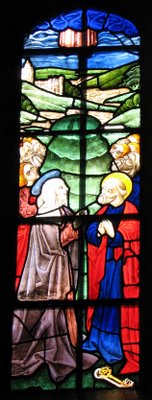The Wine of the Spirit

"[The angels asked Christ:] 'Why then is thy apparel red, and thy garments like those of the ones who treads in the winepress?' (Isa 63:2). Here the Lord is said to have had a garment, namely, his body, that was red because it was running with blood, since even then, while he was ascending, he still bore open scars in his body... Therefore the Lord answers this question as follows: 'I have trodden the winepress alone, and not a man of the Gentiles was with me' (Isa 63:3). The cross may be called a winepress, because on it he was crushed as in a press and his blood gushed forth. Or he may be calling the devil a winepress, because the evil spirit has so bound and entangled the human race with cords of sin that whatever spiritual in them is squeezed out and nothing but the sour pulp is left. But our warrior [Christ] trampled the winepress, broke the sinners' bonds, and, ascending into heaven, opened the heavenly inn and poured the wine of the Spirit."
It is for this outpouring that we pray anew in these nine days before Pentecost. May we drink deeply of the new wine of the Spirit and become as the apostles - drunk with love for Christ, the Gospel and His Church - and eager to spread that inebriation!

One such person who was certainly drunk on the Spirit is St Philip Neri, whose memorial is kept today. Called the 'Apostle of Rome', he had close associations with the Order of Preachers. He was taught and sheltered by the Dominicans of San Marco in Florence; hence, he had a particular devotion to and thought highly of the reforming friar, Savonarola, who was once Prior of that community.
St Philip Neri was to found the Congregation of the Oratory in Rome and he is famed for his love and joy, such that his heart was enlarged with charity and he is known by some as the patron saint of joy! Stories abound of his wit and fine humour and his witness of good works and zeal for souls inspired a new Pentecost in Rome, as people were converted to greater fervour in the practise of their faith.
Moreover, as Pope John Paul the Great has written, St Philip "undertook to reform and elevate art, restoring it to the service of God and the Church. Convinced as he was that beauty leads to goodness, he brought all that had an artistic stamp within the realm of his educational project. And he himself became a patron of various artistic forms, promoting sound initiatives that led to truth and goodness."
We have much need of St Philip Neri and his example in our day. May the Holy Spirit continue to inspire his sons, the Oratorians and bless and fructify their work.
that we may perfectly love You, and worthily praise You."
The stained glass window (above left) of the Ascension is from the recusant chapel of Hengrave Hall and dates to the early-16th century and has fortuitously survived the Protestant Reformation. On the right is a window depicting St Philip Neri from the Dominican Sisters' Convent at Stone.








0 Comments:
Post a Comment
<< Home